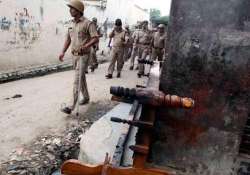Muzaffarnagar riots: PIL challenges Justice Vishnu Sahai commission report, seeks fresh probe
Lucknow: The All India Muslim Council has challenged the report of the Justice Vishnu Sahai commission set up to look into the reasons behind the ugly riots that hit Muzaffarnagar and adjoining districts, leaving over 60

Lucknow: The All India Muslim Council has challenged the report of the Justice Vishnu Sahai commission set up to look into the reasons behind the ugly riots that hit Muzaffarnagar and adjoining districts, leaving over 60 persons dead and more than 60,000 homeless in 2013.
The PIL filed before the Lucknow bench of the Allahabad High Court today sought the court's intervention seeking scrapping of the report. The PIL also seeks a fresh probe into the reasons behind the riots to be conducted either by a new court-appointed commission or by the Central Bureau of Investigation.
The committee's 775-page report, which was tabled in the Uttar Pradesh Assembly on Sunday, blamed the "negligence" of the local administration, the "failure" of the intelligence agencies and exaggerated reporting in the social and print media for the communal riots. Interestingly, no politician has been found at fault in the report.
The single-member commission headed by Justice Sahai, a former judge of the Allahabad High Court, was set up to probe the reasons for the riots and the administrative lapses in controlling the violence.
Though the report identified 14 causes for the violence, it does not indict any government member, government official or police officer. The commission said no further action would be taken against BJP MLA Sangeet Som, who had uploaded on YouTube a provocative fake video that was shot in Pakistan, until the investigation was completed.
The commission also refrained authorities from initiating any penal action against the then BSP MP Kadir Rana for an inflammatory speech.
Besides facing flak over its clean chit to the government, there are technical reasons being cited to call for a fresh probe into the incident. According to Section 24(3) of the Protection of Human Rights Act 1993, chairperson or a member of State Human Rights Commission is held ineligible for any further employment under central or state government.
Activists cite Justice Sahai's tenure as a member of the UP Human Rights Commission between June 2008 to December 2012 as a reason behind his ineligibility to be appointed as chairman of an enquiry commission under the Commission of Enquiries Act.